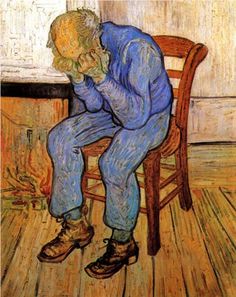 Overcast with a chilly breeze this early Monday on California’s north coast, the morning flavored with an occasional flash of faded sunshine.
Overcast with a chilly breeze this early Monday on California’s north coast, the morning flavored with an occasional flash of faded sunshine.
Pretty much the picture for the next couple of days with a big block of rain forecast to start on Friday and last a few days — in the meantime, small spurts of what the NWS calls ‘Heavy Rain‘ slated for tomorrow and Wednesday.
In wake of last night’s racially-charged Academy Awards and The Donald’s ignorance of the KKK, a new study has found that older people are really more mellow toward feelings of serenity, sadness and loneliness, and are more positive about life than the youngsters.
The lede-in sucks, I know, but does contrast old people with a physiological side of real aging.
(Illustration: Vincent van Gogh’s ‘Old Man in Sorrow (On the Threshold of Eternity)‘ found here).
The new research, which appear in the current online issue of Aging and Mental Health, are “highly clinically significant” in the care of older adults — which also includes me — by psychotherapists and workers at assisted living facilities, for example, and a bridge to an aging future.
From PsyPost last week and lead author of the study, Associate Professor Rebecca Ready of the University of Massachusetts Amherst:
She says, “Older adults report feeling more serenity than younger persons. They also have a richer concept of what it means to feel serene than younger persons.”
In a word grouping task, older adults associated more positive emotional terms with serene, such as cheerful, happy and joyful, than did younger people.
The authors speculate that “this broader conception of serene” is associated with the fact that older adults report more calming positive emotions than younger people.
She adds, “We were surprised to find that younger adults associated more self-deprecating terms with feeling sad and lonely, such as being ashamed or disgusted with themselves, than older persons.”
When grouping other emotion words with sadness, older adults included words such as droopy and sheepish, while younger adults included more self-deprecating terms with the word, such as dissatisfied with self, ashamed, angry and disgusted with self.
A similar pattern was observed for lonely.
Anger replaced by ‘droopy,’ good right?
In reality, Leo finally won, and who’s David Duke?